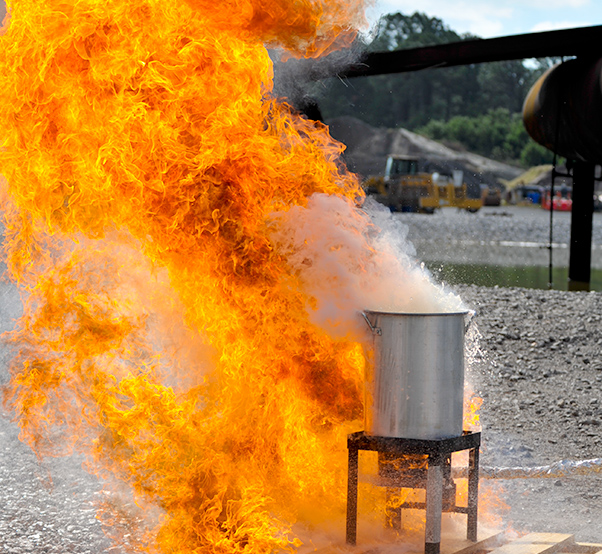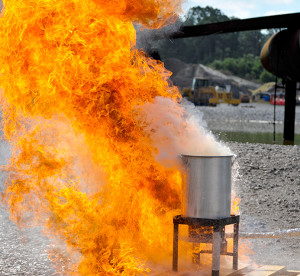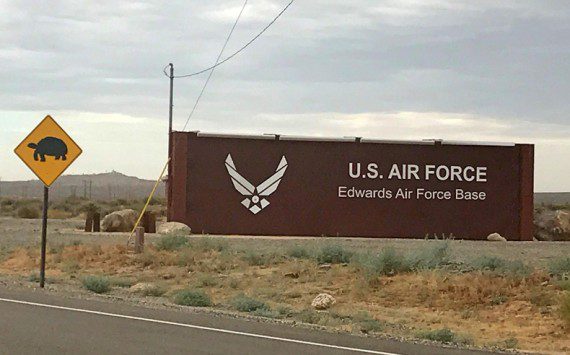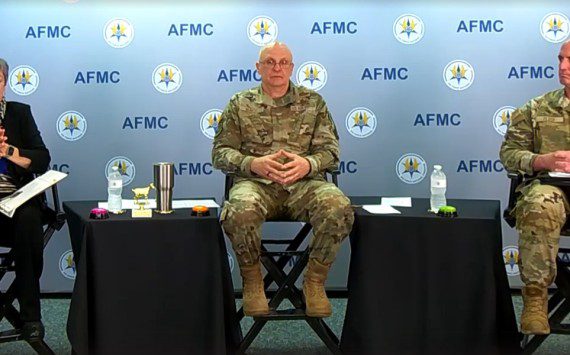A raging fire occurs after a frozen turkey is placed in an over filled turkey fryer during a safety demonstration. Ensuring turkeys are thawed, slowly eased into the fryer, and not over filling fryers with oil can prevent potential fires.
The high cost of home heating fuels has caused Americans to search for alternate sources of home heating.
The use of wood burning stoves is growing, space heaters are selling rapidly and fireplaces are burning wood and manmade logs. These methods of heating may be acceptable; however, they are a major contributing factor in residential fires. The following tips can help you maintain a fire safe home this winter.
Kerosene heaters
* Be sure the heater is in a working condition and has an emergency shut off in case it is tipped over.
* Never use fuel burning appliances without proper room venting.
* NEVER fill the heater while it is operating or hot. Refueling should be done outside of the home.
* Keep flammable liquids stored in approved metal containers outside of the house.
Wood stoves, fireplaces
* Be sure the fireplace or stove is installed properly. Wood stoves should have adequate clearance (36″) from combustible surfaces.
* Have the chimney inspected annually and cleaned if necessary.
* Do not use flammable liquids to start any fire. Don’t use excessive amounts of paper to build roaring fires in a fireplace.
* Keep screens in front of the fireplace opening to prevent embers or sparks from escaping.
* Before you go to sleep, be sure the fireplace fire is out. NEVER close the damper with hot ashes in the fireplace.
* NEVER break a synthetic log apart to quicken the fire or use more than on log at time.
Furnace heating
* It is important to have your furnace inspected to ensure all controls and emergency shutoffs are in working condition. Leave furnace repairs to qualified specialists.
* Check the flue pipe and pipe seams. Unused flue openings should be sealed with masonry or other approved materials only.
* Keep trash and other combustibles away from the heating system.
Other fire safety tips
* Never use the range or an oven as a supplemental heating device.
* If you use an electric heater, be sure not to overload the circuit. Avoid using electrical space heaters in bathrooms or areas where they may come in contact with water.
* If windows are used as emergency exits in your home, practice using them. Home escape ladders are recommended.
Turkey fryer safety
Because of the many dangers associated with hot oil turkey frying, the base fire department along with the National Fire Protection Association discourages the use of outdoor gas-fueled turkey fryers that cooks turkey in hot oil. The use of turkey fryers can lead to devastating burns, other injuries and the destruction of property. NFPA urges consumers who wish to serve fried turkey for Thanksgiving to look for grocery stores, specialty food retailers and restaurants that sell deep fried turkeys, or consider a new type of “oil-less” turkey fryer.” Below are some facts about turkey fryers consumers should take into consideration when deciding whether or not to fry turkey.
* Hot oil may splash or spill during the cooking.
* Contact between hot oil and skin could result in serious injury.
* A hot oil spill can happen with fryers designed for outdoor use using a stand. The fryer could tip over or collapse causing the hot oil to spill. Newer countertop units using a solid base appear to reduce this risk. NFPA does not believe the risks of either type of turkey fryer to be acceptable because of the large amount of hot oil involved and the speed and severity of burns.
* In deep frying, oil is heated to temperatures of 350° Fahrenheit or more. Cooking oil is combustible. If it is heated above its cooking temperature, its vapors can ignite.
* Propane-fired turkey fryers must be used outdoors. They are very popular for Thanksgiving. Many parts of the country may have rain or snow at this time of year. If rain or snow hits the hot cooking oil, the oil may splatter or turn to steam, leading to burns.
* Turkeys must be completely thawed before placing in the fryer. Partially thawed turkey will cause the oil to splatter causing serious burns.
* The fryers use a lot of oil, about five gallons. Considering the size and weight of the turkey, extreme caution must be taken when placing and removing the turkey from the fryer to be sure it is not dropped back into the fryer, splattering oil on the chef.
Finally …
Be sure every level of your home has a working smoke detector, and be sure to check it on a monthly basis. Contact Edwards AFB Fire Emergency Services, Fire Prevention Section at 661-277-3124 for advice if you have any questions concerning fire safety.













